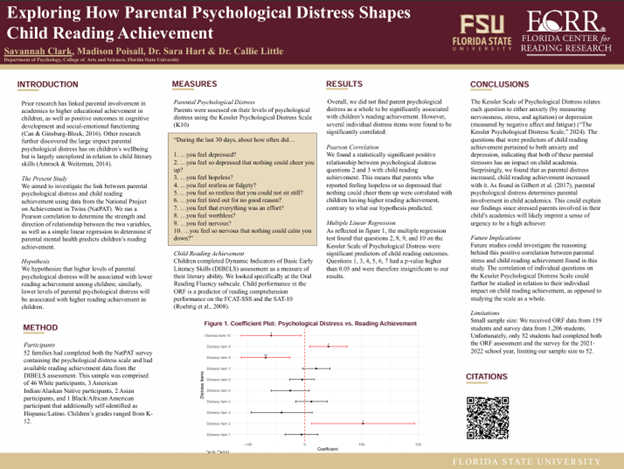Research Symposium
25th annual Undergraduate Research Symposium, April 1, 2025
Savannah Clark Poster Session 1: 9:30 am - 10:30 am/ Poster #228

BIO
My name is Savannah Clark and I am currently working towards my B.S. in Psychology at Florida State University with minors in Child Development and Criminology.
I am currently involved in two labs; I work as a DIS in Dr. Christopher Lonigan's Laboratory investigating the development of executive function in preschool aged children. I am also a DIS in Dr. Sara Hart and Dr. Callie Little's National Project on Achievement in Twins Laboratory, which investigates reading and math achievement in twins. My research interests include the influence of parental psychological distress on child academic achievement as well as peer influence on emotional development throughout adolescence.
After graduating from FSU I will pursue a Master's in Clinical Mental Health Counseling to obtain my counseling license.
Exploring How Parental Psychological Distress Shapes Child Reading Achievement
Authors: Savannah Clark, Madison PoisallStudent Major: Psychology
Mentor: Madison Poisall
Mentor's Department: Educational Psychology and Learning Systems Mentor's College: Education, Health, and Human Sciences Co-Presenters:
Abstract
Parents have a substantial impact on children throughout adolescent development, education being a large category in which this influence is salient. Can and Ginsburg-Block (2016) found that parental involvement in academics has been linked to higher educational achievement in children, as well as positive outcomes in cognitive development and social-emotional functioning. Similarly, parental psychological distress is known to influence children’s emotional wellbeing but is largely unexplored in relation to child literary skills (Amrock & Weitzman, 2014). To address this literature gap, we plan to use data from the National Project on Achievement in Twins (NatPAT) to examine parent ratings of psychological distress in relation to their children’s reading achievement, using scores from the Dynamic Indicators of Basic Early Literacy Skills (DIBELS) assessment. We hypothesize that higher levels of parental psychological distress will correlate with lower reading achievement among children; similarly, lower levels of parental psychological distress will correlate with higher reading achievement in children. We plan to first test the strength and direction of the relationship between parental psychological distress and children’s reading achievement using a Pearson correlation. We will then use a multiple linear regression to determine if parent mental health predicts children’s reading achievement. Doing so will fill a needed gap in research pertaining to parental influence on child reading achievement, as well as bringing awareness to parents of their impact on their child’s academia.
Keywords: psychological distress, parental impact on children, reading achievement

